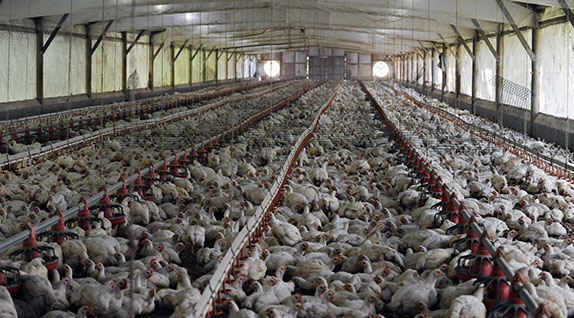The creation of a "superbug" due to the lack of finishing your antibiotics prescription has been a longstanding fear in our community. The understanding that only the strongest bugs will survive a 2 week antibiotic regiment is simple to understand, and their reproduction afterwards is assumed. This has been a troubling truth that has plagued the scientific community ever since the discovery of penicillin. The dosages prescribed have increased exponentially over the years, and trends are showing that this is something that will continue, as we do not have very many other methods to fight harmful bacteria in our bodies.
This groundbreaking article suggests that humans are not the problem. It shows that statistically, 80% of antibiotics, including the most powerful ones reserved for the deadliest of diseases, are used on animals. Farmers feed their livestock antibiotics to ensure maximum survival rates, and to turn a maximum profit off of feeding and raising these animals. The World Health Organization (WHO) is suggesting that animal antibiotic intake be severely lowered, and animals with serious bacterial infections be quarantined and left to die. They argue that trying to cure these animals will only result in more problems in the future.
The study published in The Lancet Planetary Health showed that a reduction in antibiotic use in a farm setting resulted in a 39% decrease in antibiotic resistant bacteria. This problem must be understood as an exponential relationship, where every single antibiotic resistant bacteria could cause thousands of times more damage in the future, than the damage prevented by killing off its less resistant counterparts.
The article suggests that these superbugs are being passed to humans through direct contact on the farm as well as through ingestion of food. A separate investigation conducted by the Guardian shows that the superbug MRSA is found in higher rates than ever before in commercially produced pork, and is literally sitting on the shelves of supermarkets. These kind of statistics are what is causing The WHO to urge producers to cut down on the use of these medicine on their livestock. This is receiving heavy pushback from the meat factories as it will cause heavy decline in production and lead to many other logistics problems. Unfortunately there are few alternatives in the scientific pipeline and all signs point to the fact that action must be taken immediately.
This MRSA superbug has even been found in the umbilical cord of newborn babies. The trail of evidence was directly linked to the contaminated meat sold in the supermarkets. This bug is rarely deadly, but it does cause infections. The problem is not the fact that it will kill people, but the fact that it is so hard to stop once the infection is caught. The superbug will be stagnant until the immune system is weakened, and then it can still strike. It is comforting that this particular bacteria is not deadly, but in the future the development of stronger, more deadly bacteria is imminent.

https://www.theguardian.com/environment/2017/nov/07/farmers-must-stop-antibiotics-use-in-animals-due-to-human-health-risk-warns-who
https://www.theguardian.com/society/video/2015/jun/18/superbugs-la-mrsa-pigs-antibiotics-video
This groundbreaking article suggests that humans are not the problem. It shows that statistically, 80% of antibiotics, including the most powerful ones reserved for the deadliest of diseases, are used on animals. Farmers feed their livestock antibiotics to ensure maximum survival rates, and to turn a maximum profit off of feeding and raising these animals. The World Health Organization (WHO) is suggesting that animal antibiotic intake be severely lowered, and animals with serious bacterial infections be quarantined and left to die. They argue that trying to cure these animals will only result in more problems in the future.
The study published in The Lancet Planetary Health showed that a reduction in antibiotic use in a farm setting resulted in a 39% decrease in antibiotic resistant bacteria. This problem must be understood as an exponential relationship, where every single antibiotic resistant bacteria could cause thousands of times more damage in the future, than the damage prevented by killing off its less resistant counterparts.
The article suggests that these superbugs are being passed to humans through direct contact on the farm as well as through ingestion of food. A separate investigation conducted by the Guardian shows that the superbug MRSA is found in higher rates than ever before in commercially produced pork, and is literally sitting on the shelves of supermarkets. These kind of statistics are what is causing The WHO to urge producers to cut down on the use of these medicine on their livestock. This is receiving heavy pushback from the meat factories as it will cause heavy decline in production and lead to many other logistics problems. Unfortunately there are few alternatives in the scientific pipeline and all signs point to the fact that action must be taken immediately.
This MRSA superbug has even been found in the umbilical cord of newborn babies. The trail of evidence was directly linked to the contaminated meat sold in the supermarkets. This bug is rarely deadly, but it does cause infections. The problem is not the fact that it will kill people, but the fact that it is so hard to stop once the infection is caught. The superbug will be stagnant until the immune system is weakened, and then it can still strike. It is comforting that this particular bacteria is not deadly, but in the future the development of stronger, more deadly bacteria is imminent.

https://www.theguardian.com/environment/2017/nov/07/farmers-must-stop-antibiotics-use-in-animals-due-to-human-health-risk-warns-who
https://www.theguardian.com/society/video/2015/jun/18/superbugs-la-mrsa-pigs-antibiotics-video
No comments:
Post a Comment